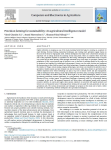Vinod C.S.S., Hareendran S.A., Albaaji G.F. (2024). Precision farming for sustainability: an agricultural intelligence model. Computers and Electronics in Agriculture, 01/11/2024, vol. 226, p. 109386.
https://doi.org/10.1016/j.compag.2024.109386
https://doi.org/10.1016/j.compag.2024.109386
| Titre : | Precision farming for sustainability: an agricultural intelligence model (2024) |
| Auteurs : | C.S.S. Vinod ; S.A. Hareendran ; G.F. Albaaji |
| Type de document : | Article |
| Dans : | Computers and Electronics in Agriculture (vol. 226, November 2024) |
| Article en page(s) : | p. 109386 |
| Langues : | Anglais |
| Langues du résumé : | Anglais |
| Catégories : |
Catégories principales 06 - AGRICULTURE. FORÊTS. PÊCHES ; 6.4 - Production Agricole. Système de ProductionThésaurus IAMM AGRICULTURE DE PRECISION ; SYSTEME DE PRODUCTION ; AGRICULTURE NUMERIQUE ; INTELLIGENCE ARTIFICIELLE ; DURABILITE |
| Résumé : | Digital cultivation is emerging as one of the most promising fields that helped in creating an ecosystem for smart farming. Precision farming, modernized techniques, and creating smart agriculture supply chains are the need of the hour for high-quality yield. Artificial Intelligence (AI) helps create a framework and plays an important role in making decisions by analysing various data points. There are countries where more than 70% of the population depends on agriculture for their living, technological advancements help to improve crop yields and get better farming results through sustainable ways. Each stage in agriculture, starting from preparation of land, crop selection, type of fertilizer to use, to the kind of watering needed for the crops; can be monitored and regulated by technological advancement. Farmers can also make decisions and implement the best practices in their field by using AI and allied technologies. Disruptive technologies such as blockchain, the Internet of Things, remote sensing, imaging technologies, and drones can transform the primitive way of agriculture. Market analysis and user demands can also be foreseen, which helps farmers to get better yields. Another important sector where technology can play a big role in disease control and pest management. Artificial Intelligence-based farming creates high productivity and better yield, increasing individual farmers’ profit. In this study, the authors would like to throw light on AI and allied technologies, which can make agricultural productivity increase significantly. In a post-pandemic situation, high-yield and more productive farming will have a major impact. An agricultural intelligence framework model for self-sustained farming is proposed in this work. The proposed framework will help achieve self-sustained growth with increased economic stability. An end-to-end supply chain ensures customers are provided with quality products and farmers are not financially looted. Technology-driven farming will also push the next generation to take up agricultural jobs. The various advancements and strategies we propose in this study aim to build a better ecosystem for transforming Artificial Intelligence into agricultural intelligence. |
| Cote : | Réservé lecteur CIHEAM |
| URL / DOI : | https://doi.org/10.1016/j.compag.2024.109386 |







